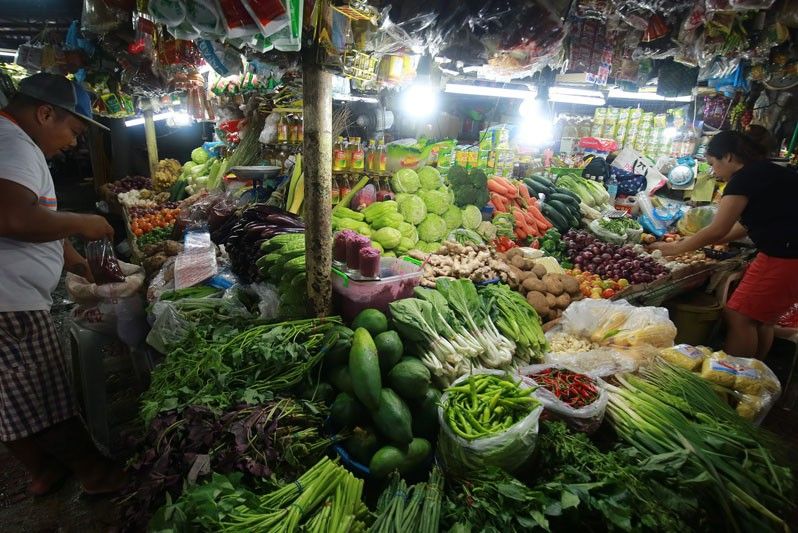Inflation steady at 6.7%

MANILA, Philippines — The country’s inflation rate remained at 6.7 percent in October – the same rate as September and the highest in almost a decade – as slower growth in food prices was seen, likely keeping the Bangko Sentral ng Pilipinas (BSP) on course for further policy tightening, the Philippine Statistics Authority (PSA) reported yesterday.
The latest figure brings the average headline inflation rate in the first 10 months of the year to 5.1 percent, still well within the revised government forecast of 4.8 percent to 5.2 percent for this year.
It was the first time this year that inflation in one of Asia’s fastest-growing economies has steadied, although economists had expected it to ease, prompting forecasts of another interest rate increase when policymakers meet next week.
The BSP had forecast inflation within a range of 6.2-7.0 percent for October.
Growth in the heavily weighted food and non-alcoholic beverage index, which had a 55.4-percent contribution to the headline rate, slowed down to 9.4 percent in October from 9.7 percent in September.
Slower annual gains were seen in the indices of corn, meat, fruits and vegetables.
Meanwhile, prices of rice rose faster at 10.7 percent in October from 10.4 percent in September. Fish prices rose to 13.8 percent in October from 13.4 percent in September.
Likewise, increases in the prices of alcoholic beverages and tobacco grew slower at 21.6 percent in October – contribution of 5.2 percent to the headline rate.
Faster growth, however, was seen in two other commodity groups that had significant contributions to the headline rate.
The index of housing, water, electricity, gas and other fuels grew at 4.8 percent in October (16-percent contribution).
Those of transport (10.8-percent contribution) and restaurant and miscellaneous (8.2-percent) grew at 8.8 percent and 4.2 percent, respectively, in the same month.
Other commodity groups that registered price increases were furnishing and household maintenance, health and recreation and culture.
Consumer prices are rising slower within the year as seen in the downtrend of the month-on-month growth rates to 0.3 percent in October from 0.8 percent in September.
Month-on-month growth reached its peak of 0.9 percent in August.
“The increase in prices has stabilized to 6.7 percent, but since August, we have noted that the rise in prices is slowing down,” national statistician Grace Bersales, who also heads PSA, said.
The damage to food supply caused by Typhoon Ompong had been factored into the October inflation rate, according to Bersales.
Meanwhile, the inflationary effect of the bus and jeepney fare hikes approved recently by the Land Transportation Franchising and Regulatory Board is expected in the November headline rate.
Inflationary pressures seem to be easing in the National Capital Region as headline inflation slowed down to 6.1 percent in October from 6.3 percent in September, according to the PSA.
Inflation remained elevated in areas outside the NCR at 6.8 percent in October, the same figure as in September, as these include areas damaged by Ompong.
The highest rate was registered for the Bicol region at 9.9 percent in October. Central Luzon had the lowest inflation rate of 4.4 percent during the same month.
In areas outside the NCR, faster annual upticks were seen in the indices of furnishing, household equipment and routine maintenance of the house; health; transportation; communication and restaurant and miscellaneous goods and services.
“Inflation remained high in areas affected by Typhoon Ompong,” Bersales confirmed.
Since the second half of the year, the government has enforced several non-tariff measures to increase the supply of key foodstuff and curb the rise of consumer prices. These cover the removal of administrative and non-tariff barriers on the importation of key food items such as rice, fish, sugar, meat and vegetables as well as the immediate release of rice stocks from warehouses of the National Food Authority (NFA).
This was combined with a series of policy rate hikes by the BSP to prevent a second round of effects.
The BSP has raised interest rates in its last four consecutive meetings by a total of 150 basis points, bringing its benchmark rate to 4.5 percent in a bid to cool inflation.
But BSP Governor Nestor Espenilla said the latest data show inflationary pressures are moderating.
“It’s a significant deceleration, although the headline figure remains elevated. The second-round effects have been also muted, so far. That augurs well for a return to the inflation target by 2019,” he told reporters in a text message.
The BSP is targeting inflation of two to four percent for 2018 to 2020.
Bersales noted, however, that it would still take some time for the full effects of these measures to be felt.
“I believe that whatever the government is doing to help us cope with increasing prices seems to be working,” she said. “If the government continues what it is doing now, inflation will continue to ease.”
Food supply stability
In a joint statement, economic managers said more attention should be given to ensuring the stability of food supply, particularly rice, as it remains to be the major contributor to inflation.
“To compensate for the lost harvest in typhoon-affected areas, rice imports should be closely monitored to ensure that their arrival is timely and sufficient,” the statement said.
The National Single Window System also has to be efficiently operationalized to ensure fast and efficient processing of imports.
Economic managers also urged the Department of Agriculture to speed up distribution of seed buffer stocks for rice, corn and other buffer stocks in disaster-hit areas in time for the November-January planting season.
They also reiterated their call to Congress to pass the amendments to the Agricultural Tariffication Act that would help lower rice prices by as much as P7 per kilogram.
Other measures that would ease food supply pressures include diverting agricultural products to more retail outlets while farms in Luzon are still recovering.
The truck ban imposed by the Metropolitan Manila Development Authority can also be relaxed for food deliveries.
“Setting our sights on longer horizons, more should be done to ensure price stability of food products. The government needs to pay closer attention to the agriculture and fisheries sector to significantly increase productivity and to be more competitive and resilient to weather-related and man-made shocks,” economic managers said.
‘Gov’t on right track’
The Duterte administration’s actions have helped steady the rate of inflation in October that fell within the forecast of the BSP, according to presidential spokesman Salvador Panelo.
He said President Duterte is apparently on the right track in mapping out efforts to reduce the prices of goods in the market.
“I think so, considering the directives of the President supplying us with food and other measures undertaken by the Department of Finance (DOF) as well as Agriculture and Trade, I think that contributes (to the steady prices of basic goods),” Panelo said at a regular press briefing in Malacañang yesterday.
Duterte also revamped the NFA to allow entry of imported rice, which economic managers earlier saw as a main contributor to the high monthly inflation.
Panelo expressed hope that the prices of commodities will remain steady in the run up to the Christmas season.
“Hopefully – it depends on global conditions. Of course, the government hopes that it will not go up and, hopefully, it should go down,” he said.
“The same measures are being undertaken by Departments of Finance, Trade and Industry as well as Agriculture. You must remember that we flooded the market with food supply – that’s one,” he added.
Panelo noted that the DOF also moved to reduce the expenditure of the government, among others.
Slowdown expected
Senate President Pro Tempore Ralph Recto yesterday said he expects inflation to further slow down but warned the government not to let its guard down.
He noted that rice and oil prices are declining and the peso has slightly appreciated.
“Although oil prices are volatile. It could increase if the US pressures both China and India and a few other countries to stop importing (oil) from Iran,” Recto said. “And if that happens, the exchange rate may weaken once again.”
Congress is expected to pass the Rice Tarrification Bill within the year and help temper inflation, according to Recto.
He, however, said the government must ensure that all duties collected under the bill, once enacted into law, must be used to assist farmers to increase productivity.
Meanwhile, Sen. Joel Villanueva will soon push for the immediate approval of a bill that could be a replacement for the proposed second package of the Tax Reform for Acceleration and Inclusion or TRAIN 2, which he said is unlikely to be passed at the Senate.
Villanueva said he would file a bill that seeks to reduce the value-added tax from 12 percent to 10 percent while removing VAT privileges of certain industries.
He said the reduction of the VAT is estimated to result in a revenue loss of about P140 billion annually but the bulk of it could be offset by lifting the VAT exemptions of certain sectors.
The senator is pushing for the VAT reduction to accompany what he said was the inadequate P25 wage hike.
“Now is the right time to (reduce VAT),” Villanueva said, adding that TRAIN 2 was “too sweeping” and could lead to massive job losses. – With Christina Mendez, Paolo Romero
- Latest
- Trending

























